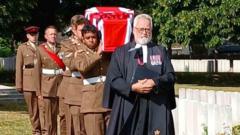Why Are We Honoring World War One Soldiers with a Reburial Service?

Honoring the Sacrifice: The Reburial of Eight British Servicemen from World War One
The recent reburial of eight British servicemen, who made the ultimate sacrifice during World War One, serves as a poignant reminder of the human cost of conflict. After more than a century, these soldiers were laid to rest with dignity at the Loos British Cemetery in France. The discovery of their remains during the construction of a new hospital outside Lens has not only provided closure for their families but also emphasized the importance of honoring our history. As we reflect on this solemn occasion, it’s crucial to understand the significance of these servicemen’s lives and the broader implications of their sacrifice.
The Discovery: Unearthing History
The recent discovery of these eight servicemen's remains highlights the ongoing efforts to identify and honor those who fought valiantly in World War One. The excavation occurred during the construction of a hospital, a place that symbolizes healing and hope, contrasting sharply with the harrowing experiences of the soldiers who fought in the trenches. Among the identified were Cpl Alfred James Morrant and Pte Henry Joseph Rycraft from the 11th Battalion The Essex Regiment, and Pte Arthur Albert Grayston and Pte Lewis Ephraim Lambert of the 8th Battalion The Bedfordshire Regiment. Their stories, long buried, have finally resurfaced, reminding us of the lives interrupted by war.
Identifying the Fallen
Identification of these soldiers was achieved through advanced DNA testing, a process that highlights the technological advancements in forensic science. This method not only provides closure to families but also helps to personalize the history of World War One, transforming statistics into real lives. Cpl Morrant’s great-great-nephew, Paul Morrant, expressed the profound impact of this experience, reflecting the emotional weight carried by descendants of those who served. It is a testament to the enduring legacy of these men who, after more than a hundred years, still resonate deeply in the hearts of their families.
The Context: The Battle of Arras
Understanding the backdrop of the Battle of Arras is essential to grasp the gravity of the servicemen's sacrifice. Fought in 1917, this battle was characterized by intense warfare and significant loss of life. It was part of the larger conflict of World War One, which saw unprecedented levels of technological advancement in weaponry, leading to devastating consequences on the battlefield. The 11th Battalion of The Essex Regiment and the 8th Battalion of The Bedfordshire Regiment were among the many units that faced harsh conditions, and the loss of life was staggering.
The Human Toll of War
The Battle of Arras is remembered not just for its strategic importance but for the profound human cost. Soldiers were often thrust into violent confrontations with little preparation, and the psychological impact of such experiences has echoed through generations. The reburial service serves as a reminder that behind the statistics of war are individual stories—of fathers, brothers, and sons—who left home with hopes and dreams only to have them tragically cut short. The emotional gravity of such events is palpable, especially during ceremonies that honor their memory.
Family Connections and Remembrance
The presence of family members at the reburial service further emphasizes the personal connections that remain through time. Jennifer Strawn, the granddaughter of Pte Grayston, attended the service alongside serving soldiers from the 2nd Battalion of The Royal Anglian Regiment. Their participation signifies the continuation of military traditions and the importance of remembering the sacrifices made by previous generations. This connection between past and present demonstrates how the legacy of these servicemen influences current and future servicemen and women.
The Role of Commemoration
Commemorating the sacrifices of those who served in World War One is crucial for several reasons. Firstly, it acknowledges the bravery and dedication of the soldiers, ensuring that their contributions are not forgotten. Secondly, it serves as a reminder of the horrors of war, fostering a culture of peace and understanding. Lastly, it strengthens community ties, as families and veterans come together to honor shared histories. The reburial service at Loos Cemetery is a powerful testament to the enduring impact of remembrance.
The Significance of Historical Reburials
Reburial services like the one held for these eight servicemen are significant for multiple reasons. They provide closure for families, allow communities to come together in remembrance, and serve as an educational opportunity for younger generations. Such events remind us of the sacrifices made throughout history and highlight the importance of learning from the past. They also serve as a poignant reminder of the ongoing need for peace in a world still affected by conflict.
Connecting Generations
These ceremonies bridge the gap between generations, highlighting the importance of sharing stories and experiences. The descendants of these servicemen carry their legacies into the future, ensuring that their sacrifices are not forgotten. By participating in such events, families can strengthen their connections to the past, fostering a sense of pride and understanding. This generational connection is vital for preserving history and ensuring that the lessons learned from World War One continue to resonate today.
Lessons from the Past: How They Shape Our Future
Reflecting on the lives of soldiers like Cpl Morrant and Pvt Rycraft provides us with valuable lessons about courage, sacrifice, and the importance of remembering history. As we commemorate their bravery, we are reminded of the need for peace and understanding in our contemporary world. The experiences of these servicemen during World War One teach us about the consequences of conflict and the importance of striving for a more harmonious future.
Honoring Their Legacy
To honor the legacy of these brave men, we must continue to educate ourselves and others about the impact of war. By sharing their stories, we ensure that their sacrifices resonate through time. Schools, communities, and families play a crucial role in this process, fostering dialogue about the past and its relevance to our lives today. The reburial service serves as a reminder that history is not just about dates and events; it is about the people who lived through those times.
Conclusion: A Commitment to Remember
The reburial of these eight British servicemen is a significant moment in honoring their sacrifice during World War One. It serves as a powerful reminder of the human cost of conflict and the importance of remembering those who served. As we reflect on this solemn occasion, let us commit to honoring their memory not just on special occasions, but in our everyday lives. By sharing their stories and learning from the past, we can contribute to a more peaceful future.
FAQs
What was the significance of the reburial service for the eight British servicemen?
The reburial service honored the sacrifice of these servicemen who died in World War One, providing closure for their families and emphasizing the importance of remembering history.
How were the servicemen identified after more than a century?
The servicemen were identified through advanced DNA testing, allowing families to connect with their ancestors and honor their legacy.
What can we learn from the Battle of Arras?
The Battle of Arras teaches us about the human cost of war and the importance of peace, reminding us to strive for understanding and cooperation in our contemporary world.
Why is commemoration important in today's society?
Commemoration is essential as it acknowledges the bravery of those who served, fosters a culture of peace, and strengthens community ties through shared histories.
How can we honor the legacy of World War One soldiers today?
We can honor their legacy by educating ourselves and others about their sacrifices, sharing their stories, and striving for a more peaceful and understanding world.
The legacy of these brave servicemen continues to resonate today. How can we ensure their stories are told and remembered for generations to come? #WorldWarOne #Remembrance #HonorTheFallen
Published: 2025-07-21 07:21:08 | Category: technology



